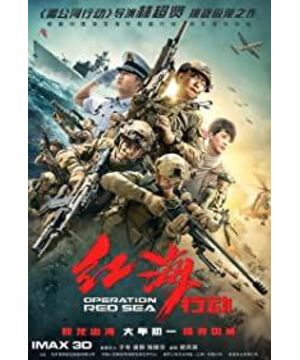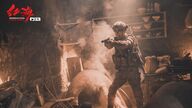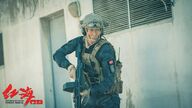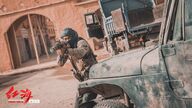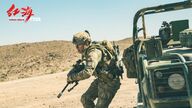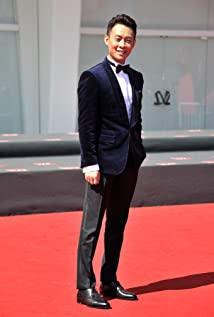"Operation Red Sea" can be said to be the domestic film with the best visual effects and the largest scale so far. Even at a time when the film industry is highly developed and green screen matting has become a routine method, the heavy image quality brought by real shooting is still unmatched. "Saw Ridge" and "Operation Red Sea" directed by Lin Chaoxian are excellent examples. In terms of scale, it is undoubtedly a shocking "R-level", and the blood level is no less than that of "Blood Battle Hacksaw Ridge" and "Saving Private Ryan": the head that was shot through, the severed limbs that were blown away, and the burns. The flesh and blood bodies are all refreshing my understanding of domestic war movies. At the end of 2017, Feng Xiaogang's long shot about war in "Youth" undoubtedly made great progress compared with the previous war-themed film and television dramas in our country. But "Operation Red Sea" has a subversive breakthrough in terms of length and "realism" compared to it. In terms of production level, it is almost the same as Hollywood's film and television dramas of the same type, which is undoubtedly something that the Chinese people can be proud of. The film is excellent in the grasp of the first book. Like the opening scene of "Wolf Warrior 2", pirates hijack merchant ships, and battles take place between the protagonist and the pirates. But "Operation Red Sea" played a flower in this segment - when the Jiaolong commandos launched an attack, the director used a very exaggerated upgraded shot to show the commandos killing the pirates among the lightning and flint. In shooting games such as "Call of Duty", this technique is often referred to as "bullet time". In his "violence aesthetics", he often resorts to this technique. After the end of the first book, it is followed by the introduction of the main characters. As a film with a group as the protagonist, the introduction focuses on how to make the audience clearly remember the characteristics and responsibilities of each member. Like "Justice League", after the end of the first book, it took about one-third of the page to introduce five heroes and two villains, and "precisely" allotted about 5 minutes to each person, taking turns in turn. . Such a stinky and long foreshadowing greatly slowed down the rhythm of the film, and at the same time also killed the audience's interest and attention accumulated in the first book. In "Operation Red Sea", the director did not deliberately arrange the plot to introduce the characters, but only through the subtitles, especially relying on the behavior of everyone in the battle and the weapons they used, quietly showed the positioning of each team member, This saves a lot of space, making the film progress more smoothly. But even so, compared to Lin Chaoxian's last work "Operation Mekong", "Operation Red Sea" is extremely protracted in the rhythm of the film, and there is an obvious sense of incoherence between sections. Although both films belong to "new theme films", they can be divided into genre films. "Operation Mekong" tends to be Lin Chaoxian's best show: police and crime movies, while "Operation Red Sea" belongs to war movies. Perhaps this is the first time he has come into contact with such a large-scale production, and Lin Chaoxian seems a little powerless. In "Operation Mekong", because the scenes are relatively closed and narrow, most of them use medium, close and special scenes, supplemented by hand-held cameras and a large number of follow-up shots, the standard Hong Kong-style police and bandit film shooting methods, Lin Chaoxian has long been comfortable with this. However, in "Operation Red Sea", Lin Chaoxian still used the same shooting technique to present the shootout. In the two scenes of rescuing the hostages, because they are mainly indoor scenes, they present an excellent viewing effect. However, in the field of combat, because the environment is extremely open, it cannot be presented simply by using a smaller scene. Therefore, at the beginning of the clip, Lin Chaoxian first explained the environment with an overhead shot of a large long-range lens, and then continuously used three types of scenes, namely medium, close and special, and the editing rate was faster. In general action movies, since close-quarters combat is the main focus and gun shooting is supplemented, hand-held cameras, small scenes and fast editing rates can more accurately show the fierceness and intensity of fighting. ” is a perfect example. But in war films, the space is very wide, and the two sides are far apart. Only guns and guns are used to fight each other. In this case, handheld cameras and small scenes are used to shoot. Overall, it is too simple and rude, making it difficult for the audience. A more comprehensive understanding of the battle, but also easy to produce visual fatigue.
Secondly, "Operation Mekong" is a straightforward single-line narrative from beginning to end. Most of the film is based on Gao Gang's perspective, and the story develops closely around him. Therefore, the main plot progresses extremely smoothly, without any sloppy sidelines. However, after the end of the first book and entering the official plot, "Operation Red Sea" began to use the method of multi-line parallel narrative to draw clues to characters. As a result, it committed the same problem as "Justice League". The foreshadowing was too long and the audience was lost The passion also caused the audience's attention to be distracted, so that when the atmosphere began to gradually become tense, it was difficult for the audience's emotions to match it.
In addition, compared with "Operation Mekong", "Operation Red Sea" is not satisfactory in terms of film rhythm and the proportion of civil and military dramas. "Operation Mekong" vividly shows Lin Chaoxian's ability to control police and bandit action movies. In the twists and turns of the story, the beginnings and transitions of each stage are intricate and fascinating. The rhythm of the film is relaxed, but it brings enough pressure to the audience. The popularity and intensity of several gun battles were like a tide, one wave after another, reaching its peak in the final battle. On the whole, literary dramas are bigger than martial arts dramas. A large number of character monologues, dialogues, and even a small amount of flashbacks are placed between the shooting scenes, showing the characters' behavioral motives little by little, making the characters more plump and three-dimensional. Especially the role of Fang Xinwu played by Eddie Peng, only through literary drama audiences can understand his past: the reason for coming to Thailand and why he has a bone-chilling hatred for Nuoka. The audience even knows that his cynicism is just a mask used to cover up the deep hatred in his heart. The role of literary drama in shaping the image of the characters is vividly reflected in this film. On the other hand, "Operation Red Sea", the whole film is almost composed of five war scenes, and the literary drama can be ignored. Because the main driving force and clues for the development of the film's story come from the instructions, the characters lack individuality and uniformity, and on the whole they are as thin as a blank sheet of paper. In the film, the slightly outstanding characters may be Li Dong, Tong Li and Shi Shi. Under the encouragement of Gu Shun and the pressure of war, Li Dong overcame his fear and grew up. However, due to the limitation of space, the director did not make too many characterizations and descriptions of Li Tong, so the growth was slightly lacking in rationality. And the love between Tong Li and Shishi did not break the love, but added a touch of tragic and tenderness to this tragic war. In the pitiful literary drama, I thought that after experiencing the previous ambush, the Jiaolong team members would have a deeper understanding of the war, and the director could also take this opportunity to, through the lines of dialogue between the actors, to the The audience instills some "anti-war" ideas. However, after saying the slogan of "the strong are invincible", the clip came to an abrupt end, which made me feel a little stunned. It can be said that this sense of embarrassment is the most conspicuous sign of the literary and drama part of the film. It is very abrupt and out of place in the whole film. In the martial arts part, the fighting scenes and the progressive scale of the layers are very prominent, but because each war scene is too exciting and intense, the audience's emotions are always kept in an extremely excited state. But because the length of the war scene reached a terrifying 90 minutes, such a dense "banging"
Compared with "Operation Mekong" in which the positioning of team members is relatively vague, the division of labor among team members in "Operation Red Sea" is undoubtedly clear and clear. In fact, "Operation Red Sea" should belong to "Saving Private Ryan" and "Black Hawk Down"-style collective heroism type film, because the protagonist of the film is the team rather than a member. As a more prominent leading figure, the captain only played a role in connecting the soul in the film. Other players in the squad still have the opportunity to show themselves and play an irreplaceable key role in the action. But "Operation Mekong" should belong to the partner-shaped personal heroism commonly used in traditional Hong Kong-style police and gangster films. For example, in the classic "New Police Story", Chen Guorong played by Jackie Chan and A Feng played by Nicholas Tse are such a pair of partners with Chen Guorong as the main and A Feng as the supplement, while the other police teammates are passers-by who play soy sauce. . The protagonist in "Operation Mekong" is obviously Gao Gang, and the main point of view is also focused on him. He and Fang Xinwu are close partners, while the other squad members are more like their vassals and don't have much chance to perform. Therefore, "Operation Mekong" is full of lingering old Hong Kong films and deep imprints. This can be regarded as a kind of memory or tribute to the golden age of Hong Kong film by Lin Chaoxian! "Operation Red Sea" brought me the biggest awkwardness in the movie viewing experience: the editing of transitions is too blunt, and the phenomenon of raw cuts often occurs. This is especially reflected in the multi-line parallel narrative part at the beginning, where the story in one scene just ends, and the transition to the next scene is made non-stop through raw cuts. There are no freeze-frame transitions, close-up transitions, and analogous overlay transitions. There are even situations where the actors in the picture jump and cut before they have completed their actions. This phenomenon is actually just a microcosm of the overall image style of the film—simple, rude, and too straightforward. In addition, the scene of rescuing the hostages in the hostage rescue may be to highlight the chaotic scene of the team members fighting each other after the plan was disrupted. Each part of the gunfight scene is particularly independent. , but ignores the players who are also involved in gunfights in other scenes, as if they forgot their existence. Therefore, in terms of presentation, it is more like a parallel narrative than a cross-narrative. Such a sense of separation is most evident in the fragment of Shitou's sacrifice - the three of them are trapped in the house, helplessly resisting the tide. The enemy army, and Gu Shun and Li Dong, as reinforcements, were on their way to reinforcements. According to Hollywood's narrative habits, the "last-minute rescue" technique pioneered by Griffith in "Party Dissent" is usually used here to show the despair and madness of the three Stones and their anxiety through cross-cutting. , with the continuous improvement of the editing rate, the inner tension of the audience is gradually pushed up, until finally, when the two story lines intersect, it reaches its peak. However, Lin Chaoxian's arrangement is: to focus on the desperate resistance of the three team members, and the fact that the two of Gu Shun came to support this behavior was only scribbled through a few quick cuts. This caused the audience to be unable to form a clear understanding of the spatial relationship between the two groups of people-why did Gu Shun and the two not arrive yet? Is it because the distance is too far? Or was it because of the enemy's interception on the road? The director didn't say anything about it. It was not until after Shi Shi's sacrifice, when the team was on the verge of death, that Gu Shun arrived and repulsed the enemy, and the scene ended. The design of this anti-routine should have become a highlight of the film, but the arrangement is slightly sloppy, and the sense of fragmentation it brings also hurts the film to a certain extent, which is very regrettable. Back to the topic section. The core of the "main theme" movie is to promote the spirit of patriotism and show the strength of the country, and "Operation Mekong", "Wolf Warrior 2" and "Operation Red Sea" are no exception. As a "new theme" movie, compared with the previous "Armageddon" series, they combine the narrative techniques of genre films and the form of Hollywood commercial blockbusters with the traditional theme, while taking into account commercial and political propaganda. A win-win at the box office and word of mouth, this is an unprecedented and gratifying turnaround. For me personally, these three movies should be ranked from high to low in my heart, "Operation Red Sea", "Operation Mekong", and "Wolf Warrior 2". Divided in terms of style, "Operation Red Sea" is a collective heroism style film in the style of "Saving Private Ryan", "Operation Mekong" is a partner-style individual heroism style film in the style of "New Police Story", and "Wolf Warrior 2" is a film in the style of collective heroism. It is a "First Blood"-style extreme personal heroism film. The three films all reflect the same theme: China is already strong, and we have the ability to ensure the safety of every citizen's life and property outside! This will undoubtedly make the audience's heart patriotic enthusiasm high!
But among the three movies, I am very repelled to "Wolf Warrior 2". First of all, I admit that Wolf Warrior 2 is a progressive movie, but I am totally disgusted by it. Why? Let me take the Chinese version of "Late Night Canteen" as an example. Why is the Japanese version of "Late Night Cafeteria" so popular in China, but the Chinese version has so many bad reviews? The reason is that the Chinese version copied the Japanese version's settings and bridges from start to finish, which is seriously divorced from China's reality. How many Chinese people go to a Japanese-style izakaya in the middle of the night for supper? How many Chinese people confide everything about themselves without reservation when they meet a stranger for the first time? At the moment when the realism style occupies the mainstream position, "realism" has become one of the key elements of a film and television drama. This kind of "realism" should not only stop at the technical level such as photography, but also need to be reflected in stories and emotions. On the other hand, "Wolf Warrior 2" promotes extreme personal heroism, but since ancient times, Chinese culture has always advocated the collectivism spirit of "sacrifice the small self to make the big self". There is no doubt that the values of "Wolf Warrior 2" run counter to the traditional concept of our country; secondly, the core goal of "Wolf Warrior 2" has shifted. Originally, both "Operation Red Sea" and "Wolf Warrior 2" were aimed at rescuing the trapped Chinese compatriots. Except for the mission of "grabbing the yellow cake" at the end of "Operation Red Sea", the plot was almost driven by this purpose. Development, there are reasonable and just motives for the behavior of the characters. In Wolf Warrior 2, however, the task turns to protecting all factory employees, whether Chinese or African. This was a noble move, but unknowingly, Leng Feng created an unequal relationship between the "protector" and the "protected" between Leng Feng and the African people. Especially in the movie, except for Leng Feng, the other Chinese and African people appear as helpless slaughtered people. It is Leng Feng's duty to protect the Chinese people, but his actions to protect the African people are a bit like the "world police" of the United States, a kind of hegemonism in the guise of a "savior", with a slight color of discriminating against the African people. In fact, if you continue to "excessively interpret" according to this logic, there is another setting in the film that is very intriguing: the African child in Kobe's jersey calls Wu Jing "Godfather". Throughout the whole film, the role of this child and his mother is very small, as if they are just to exaggerate the inseparable family relationship between mother and son, and criticize the phenomenon of separation of flesh and blood caused by war. In addition, in the scene where this child appeared, he seemed to only do two things to be funny and call "Godfather". In a normal movie, the recurring branch characters always have more or less for the development of the subsequent plot of the movie. or less push and influence, otherwise the character would appear redundant, stray from the film and hurt it. But if the mother and son were deleted from the film, would it have fatal effects on the film, such as the incoherence of the preceding and following paragraphs? Obviously not, so why do these two characters still exist? This question is worth thinking about. In "Operation Red Sea", the Jiaolong team had already rescued the hostages perfectly, and the bodies of the wounded and sacrificed comrades were also transported onto the plane. According to common sense, the story came to an end. However, the task of "grabbing the yellow cake", which has been on the sub-line in the film, suddenly jumped out, and this led to the next paragraph, which is also the last paragraph of the shooting scene in the film. This kind of treatment seems to be like a symphony playing to the last chapter. When the woodwinds and light percussions are ending, the brass instruments as the main melody suddenly appear strongly and continue to play passionately and enthusiastically! At that time, the "Story of Beethoven" suddenly appeared in my mind - the last time Beethoven conducted the symphony, after the movement was finished, he still conducted the orchestra and continued to repeat the performance until a girl came to the stage with tears to pull him, and he didn't make a difference. Perceived, because he was completely deaf. I originally thought that the director was immersed in the shootout and couldn't extricate himself, so he put all his favorite scenes on the screen for fun. But I suddenly recalled that Xia Nan said to Yang Rui: "Do you know how much harm these 'yellow cakes' will bring to the rest of the world when they are made into weapons?" This sentence. After taking a closer look, I realized that this is actually to highlight another theme of the film. Although Yang Rui's act of "grabbing the yellow cake" was not approved by his superiors, it was a spontaneous heroic act. But in addition to reflecting the heroic qualities and hatred of our soldiers, it also conforms to today's global "anti-terrorism" trend. At the national level, it reflects the responsibilities and responsibilities that China should undertake as a major country. We not only protect the lives and property of our own citizens, but also fight for the safety of people around the world. At the end of "Operation Mekong", Zhang Hanyu slowly said in his deep voice that "the Chinese government has the ability to protect the life and property of our people around the world"; at the end of "Wolf Warrior 2", it is a huge passport "Chinese citizens, please don't forget that there is a strong motherland behind you"; and the last scene of "Operation Red Sea" is: the navy warships solemnly expelled foreign warships that invaded our territorial waters with loudspeakers. All of them show that our country is now strong and strong, has the strength to safeguard national sovereignty, protect the interests of the people, and fight against every enemy with evil intentions. , to deter foreign countries, organizations and even individuals with bad intentions. With the restructuring of the Bayi Film Studio, the traditional main theme war movies represented by the "Armageddon" trilogy have gradually withdrawn from the stage of history, and replaced by "Operation Red Sea", which is more A commercialized modern "new theme" war movie. The biggest difference between traditional war movies and modern war movies is the attitude towards war. Like the "Armageddon" trilogy, the attitude towards war is support and affirmation, and its main tone is to cheer the victory of the war and praise the bravery of our soldiers. But "Operation Red Sea" focuses more on the reflection on war. Like "Saving Private Ryan", it leads the audience to think: Is it worth sacrificing the lives of several or even a dozen soldiers in order to rescue a "citizen" of the country? In addition, "Operation Red Sea", like "Blood Battle Hacksaw Ridge", shows the residual limbs. Broken arms and blood plasma, intuitively reflect the cruelty of war, bring great stimulation to the audience from the senses, and achieve the purpose of "anti-war". The "Wolf Warriors" series of films, however, shouted out the very incendiary slogan "Those who violate China will be punished even if they are far away". Seemingly warm-blooded and patriotic, it will subtly arouse strong nationalism and belligerence among the people. The younger generation who grew up in the era of peace and experienced the baptism of war will choose to use force to resolve international disputes. This is not a good sign for the long-term development of our country.
However, this is also a stage that a country must go through when producing war-themed film and television dramas. At the same time, this is a country that has been away from war for a long time and has an overly idealized understanding of war. In "Operation Red Sea", through the real weapons and equipment and explosion scenes, as much as possible to restore a real battlefield for the audience, but it always seems to have an illusory sense of unreality. The deafening sound of gunfire grabbed me firmly, but I just couldn't really enter the chaotic and brutal battlefield in the film. On the other hand, "Black Hawk Down", what attracted me was not the intense exchange of guns and guns, but the despair of American soldiers in the war, the dying soldiers' nostalgia for their parents, wives and children, and the militia's fanaticism and fearless death, just like A hand, clutching my heart tightly, made me gasp for breath. They are just young men in their early 20s. They are full of the same curiosity, excitement, and "longing" as we are about war. They are also timid and fearful before setting foot on the battlefield, and they are also frightened and afraid on the battlefield. After the battle, I will be in a trance and even be confused-why should I go to the battlefield to fight? What am I fighting for? This kind of thinking has now become the core theme of Hollywood's modern war movies. In fact, Hollywood also had a period of frenzy: for example, after World War II, the fanatical belligerence in society drove Hollywood to continuously produce such movies depicting the heroic combat of the US military and the defeat of the fascist army. Especially after 9/11, this sentiment even affected the production of action films, resulting in films such as "Mission: Impossible" and "Hurricane Rescue" centered on fighting terrorism. However, over time, people gradually returned to calm, and the frenzy gradually cooled. In particular, the tragic casualties of the Vietnam War have gradually shifted people's attention to the reflection on "why should we send troops to fight". The two bottomless pits, the Iraq War and the Afghanistan War, gradually drowned out the fanatical nationalism of the American people, and they began to discuss what a huge price this endless war caused the United States to pay for its involvement. At the same time, people have doubts about the "justice" they insist on - "Do we really send troops to invade other countries to maintain peace?". In "Black Hawk Down," the militia leader says to the captured American soldier: "Do you really think that if you capture General Aidid, the killing will stop? Will we lay down our arms and embrace American democracy? All I know is, Only with victory can there be peace." At the end of the film, when the American soldiers withdrew from the local town, the militia immediately following them stopped their pursuit and immediately returned to the original road. The residents along the way cheered happily on both sides of the road, not to welcome the victory of the US military, but to celebrate their departure. open. In the upgraded shot, the embarrassment of the U.S. soldiers formed a strong contrast with the festivity of the surrounding crowd, while the soldiers with guns and bloody faces formed a strong irony contrast with the innocent children who ran in front of them. Silently accuse them of their crimes. The scene that left the deepest impression on me should be the scene of a lonely American soldier surrounded by two child soldier brothers in a house. The soldier tried to sneak out of the house, only to be found as soon as he went out. The younger brother immediately turned his gun to shoot at him, the soldier hurriedly collapsed, and the bullet hit the older brother of the child behind him. After my brother was shot, he slowly fell to the ground, but the originally ferocious younger brother removed his disguise in an instant, crying and pounced on his brother. The huge contrast between before and after moved me instantly. The extremist organization's unconscionable training of these young children into soldiers is worthy of our disdain, but the evolution of the situation is inseparable from the wanton interference of the United States. It can be said that the United States is the real culprit. At the end of "Black Hawk Down", the US military paid an unprecedentedly painful price for this difficult rescue operation. The remains of the sacrificed soldiers were placed in coffins, waiting to be transported back to China. Under the panoramic lens, the dark room looks especially sad and desolate. In "Operation Red Sea", the sacrifice of Jiaolong's teammates is to save the lives of our citizens; in "Saving Private Ryan", the sacrifice of the squad is to make a poor mother not lose her fifth son. Their sacrifices are all It has a noble value that I am in awe of. But in "Black Hawk Down", in addition to pity, the sacrifices of the soldiers may only be sympathy, because their sacrifices, apart from satisfying the interests of some politicians, are worthless, and they are received by the locals. The people cast aside it, which undoubtedly has strong irony and criticism. Today, my country's war-themed film and television dramas have not yet touched such a profound theme. However, as the saying goes: "Art comes from practice and is higher than practice", perhaps only by actually experiencing it can one deeply appreciate this complex emotion and produce such a profound experience. However, I hope that day will never come. On the brother of a child. After my brother was shot, he slowly fell to the ground, but the originally ferocious younger brother removed his disguise in an instant, crying and pounced on his brother. The huge contrast between before and after moved me instantly. The extremist organization's unconscionable training of these young children into soldiers is worthy of our disdain, but the evolution of the situation is inseparable from the wanton interference of the United States. It can be said that the United States is the real culprit. At the end of "Black Hawk Down", the US military paid an unprecedentedly painful price for this difficult rescue operation. The remains of the sacrificed soldiers were placed in coffins, waiting to be transported back to China. Under the panoramic lens, the dark room looks especially sad and desolate. In "Operation Red Sea", the sacrifice of Jiaolong's teammates is to save the lives of our citizens; in "Saving Private Ryan", the sacrifice of the squad is so that a poor mother will not lose her fifth son. Their sacrifices are all It has a noble value that I am in awe of. But in "Black Hawk Down", in addition to pity, the sacrifices of the soldiers may only be sympathy, because their sacrifices, apart from satisfying the interests of some politicians, are worthless, and they are received by the locals. The people cast aside it, which undoubtedly has strong irony and criticism. Today, my country's war-themed film and television dramas have not yet touched such a profound theme. However, as the saying goes: "Art comes from practice and is higher than practice", perhaps only by actually experiencing it can one deeply appreciate this complex emotion and produce such a profound experience. However, I hope that day will never come. On the brother of a child. After my brother was shot, he slowly fell to the ground, but the originally ferocious younger brother removed his disguise in an instant, crying and pounced on his brother. The huge contrast between before and after moved me instantly. The extremist organization's unconscionable training of these young children into soldiers is worthy of our disdain, but the evolution of the situation is inseparable from the wanton interference of the United States. It can be said that the United States is the real culprit. At the end of "Black Hawk Down", the US military paid an unprecedentedly painful price for this difficult rescue operation. The remains of the sacrificed soldiers were placed in coffins, waiting to be transported back to China. Under the panoramic lens, the dark room looks especially sad and desolate. In "Operation Red Sea", the sacrifice of Jiaolong's teammates is to save the lives of our citizens; in "Saving Private Ryan", the sacrifice of the squad is to make a poor mother not lose her fifth son. Their sacrifices are all It has a noble value that I am in awe of. But in "Black Hawk Down", in addition to pity, the sacrifices of the soldiers may only be sympathy, because their sacrifices, apart from satisfying the interests of some politicians, are worthless, and they are received by the locals. The people cast aside it, which undoubtedly has strong irony and criticism. Today, my country's war-themed film and television dramas have not yet touched such a profound theme. However, as the saying goes: "Art comes from practice and is higher than practice", perhaps only by actually experiencing it can one deeply appreciate this complex emotion and produce such a profound experience. However, I hope that day will never come. , which undoubtedly has a strong irony and criticism. Today, my country's war-themed film and television dramas have not yet touched such a profound theme. However, as the saying goes: "Art comes from practice and is higher than practice", perhaps only by actually experiencing it can one deeply appreciate this complex emotion and produce such a profound experience. However, I hope that day will never come. , which undoubtedly has a strong irony and criticism. Today, my country's war-themed film and television dramas have not yet touched such a profound theme. However, as the saying goes: "Art comes from practice and is higher than practice", perhaps only by actually experiencing it can one deeply appreciate this complex emotion and produce such a profound experience. However, I hope that day will never come.
View more about Operation Red Sea reviews


